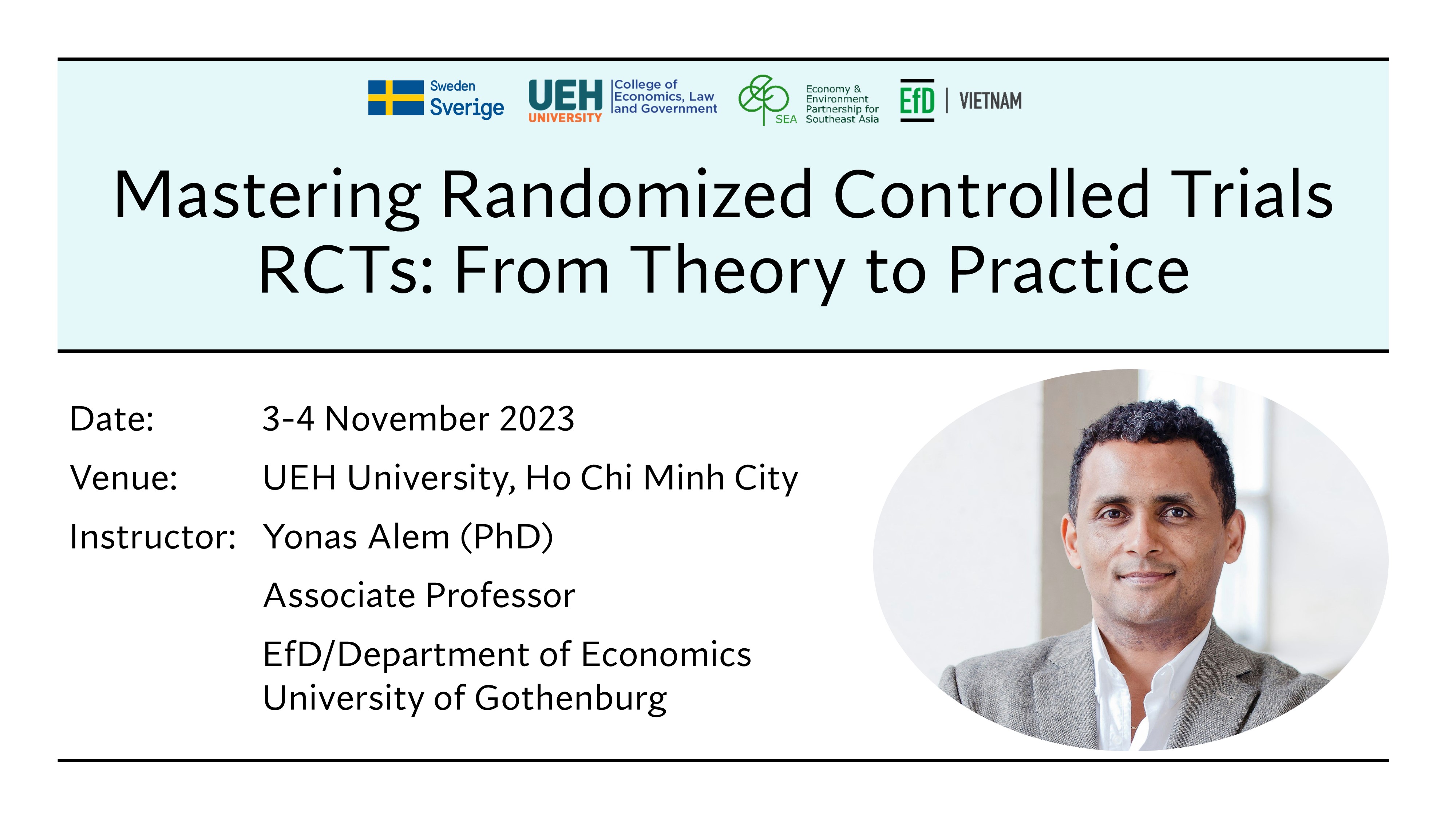Event Information
We would like to announce the upcoming training course "Mastering Randomized Controlled Trials (RCTs): From Theory to Practice" scheduled for 3-4 November 2023 at UEH University in Ho Chi Minh City.
This intensive course, led by esteemed instructor Yonas Alem, Director of Academic Programs at Environment for Development (EfD) and Associate Professor at the Department of Economics, University of Gothenburg, is designed to bridge the gap between theory and practice in the realm of randomized controlled trials (RCTs). Whether a researcher, PhD student, or academician in economics and development or any other social science discipline, this course will empower you with the knowledge and skills necessary for designing, conducting, analyzing, and reporting impactful RCTs.

Course Introduction
Randomized Controlled Trials (RCTs), also known as Randomized Evaluations, serve as a methodology for evaluating policy impacts and have gained increasing prominence. This method randomly assigns study participants to one or more groups: the "treatment group" receiving the intervention and the "control group" not. Subsequently, researchers measure the outcomes of interest in these groups. The primary objective of randomized evaluations is to provide a rigorous and unbiased estimation of the intervention’s causal impact, determining the specific changes in participants’ lives attributable to the program. Furthermore, these evaluations empower researchers and policymakers to tailor their research designs to address specific inquiries about program effectiveness and its underlying theory of change. Well-designed and meticulously executed RCTs can help understand the program’s effectiveness, potential unforeseen consequences, the primary beneficiaries, the efficacy of various program components, cost-effectiveness, and how it compares to other programs with similar goals.
This two-day intensive workshop aims to equip course participants with the fundamental aspects of RCTs. We will discuss the rationales for impact evaluations, the issues of causal inference and the counterfactual, determining sample size, treatment assignment, experimental data analysis, and management of impact evaluation projects.
Who Should Apply
This course welcomes participants from diverse social science backgrounds, including but not limited to experimental economics, development economics, environmental economics, and related fields. Participants are expected to have graduate-level training in econometrics to follow the training. As we will draw on economics papers using RCTs published in reputable journals, having graduate-level training in microeconomics will also be advantageous. If you are passionate about advancing your expertise in experimental methodologies, impact evaluation, and evidence-based decision-making, this course is tailored for you.
How to Apply
Interested candidates from diverse economics and development backgrounds are invited to submit their applications by 25 October 2023. Please visit https://airtable.com/app0vZdBESImB9ZXe/shrekXocqCn4gI0eY and complete the online application form to apply. Only successful applicants will be personally notified by 29 October 2023.
This course is hosted by UEH University. The workshop package will be sponsored by the Swedish International Development Cooperation Agency (Sida) through EEPSEA and EfD Vietnam while participants should make their own travel, meal and accommodation arrangements.
Embrace this opportunity to expand your horizons and collaborate with professionals from diverse economics and development fields. Discover the power of randomized controlled trials in shaping evidence-based policies and practices. Join us in Ho Chi Minh City for an immersive learning experience that transcends disciplinary boundaries.
For inquiries, please contact Dr. Chau Tran at chau.tran@eepsea.org.
Course Outline
1. Introduction (Day 1 morning)
- Why Evaluate
- What is Impact Evaluation
- Different Types of Impact Evaluation
2. Preparing for an Evaluation (Day 1 morning)
- Constructing a Theory of Change
- Developing a Results Chain
- Specifying Evaluation Questions
- Selecting Indicators
- Checklist: data for your indicators
3. Causal Inference and Counterfactuals (Day 1 morning)
- Causal Inference
- The Counterfactual
- Counterfeit Estimates of the Counterfactual
4. Randomized Assignment (Day 1 afternoon)
- Evaluating Programs based on the Rules of Assignment
- Randomized Assignment of Treatment
- Checklist: Randomized Assignment
5. Addressing Methodological Challenges (Day 2 morning)
- Heterogeneous Treatment Effects
- Unintended Behavioral Effects
- Imperfect Compliance, Spillovers, and Attrition
- Timing and Persistence
6. Choosing a Sample (Day 2 morning)
- Sampling and Power Calculations
- Drawing a Sample
7. Sample RCT papers (Day 2 afternoon)
- Presentation of Sample RCTs
- Examples of low-cost RCTs
- Lab: Replicating sample RCTs
Download EfD RCT 2023 Call for applications